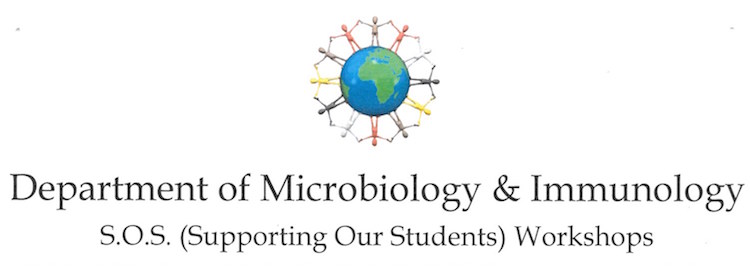Supporting Graduate Students

News Article by Emily Weber, PhD graduate student
Graduate school is stressful. Whether it is executing experiments, attempting to analyze data, or preparing for that big presentation, the life of a graduate student can be filled with a never-ending to-do list. On top of that, students have many responsibilities outside of the lab to handle. The Microbiology and Immunology department has created and funded a program named Supporting Our Students (SOS) aimed to help provide their graduate students with opportunities to de-stress and gain life skills to help them in and outside of graduate school.
Brenda Knorr, the Graduate Program Administrator for the Microbiology and Immunology department, initiated the program this fall. Knorr states, “It actually started a few years ago with an idea that Linda Lipani and I had to make sure students had the support needed to be healthy and successful, not only in graduate school but in life in general. Both of us were very busy, and we were never able to devote the time needed to get it off the ground. For several years, I would put it on my self-evaluation as a goal. We always made a little progress every year, but never enough to get it started.”
 This year, however, SOS has successfully begun and has sponsored a wide variety of events focused both on personal well-being and practical skills with speakers from around the community. The Department of Safety gave a talk discussing personal safety and active violence awareness. Consumer Credit Counseling Service of Rochester provided a money management session. Other events however, such as yoga in the Fitness and Wellness Center, have provided students with opportunities to help to relax and de-stress in positive ways.
This year, however, SOS has successfully begun and has sponsored a wide variety of events focused both on personal well-being and practical skills with speakers from around the community. The Department of Safety gave a talk discussing personal safety and active violence awareness. Consumer Credit Counseling Service of Rochester provided a money management session. Other events however, such as yoga in the Fitness and Wellness Center, have provided students with opportunities to help to relax and de-stress in positive ways.
“Stress is a constant burden in every graduate student’s life, and whether we talk about it or not, stress rules our lives. SOS is a way for students to get a handle on that stress and its side effects, the psychological, emotional, and physical side effects. It’s a way for students to talk to others and realize that everyone, and I mean everyone, has some level of stress and anxiety. If they say they don’t, they’re lying,” said Rachel Warren, a 2nd year graduate student in the Microbiology and Immunology department. “Spending time to talk about the stress itself, the cause of the stress, and the side effects can limit how much we are controlled by it. SOS gives us an outlet to vent our frustrations to weaken the burden that being a graduate student causes.”
In the upcoming months, SOS plans to continue sponsoring a range of activities to assist students. January 9 (2:00-3:00 pm), 2nd year Microbiology and Immunology graduate students will have the opportunity to attend a workshop explaining what they should expect and how they can prepare for their Qualifying Exam. Other ideas on the table for future events include educating graduate students about the resources available to them. For example, the University Health Service (UHS) could explain what is available through the student health insurance and a workshop with the University Counseling Center (UCC) could discuss mental health issues like stress, depression, anxiety, and abuse. Other events could involve more basic life skills, such as time management, protecting your identity, or dealing with difficult people.
“The main goal of SOS is to give students the opportunity to build life skills that will enrich their lives while in graduate school and beyond,” said Knorr. “SOS is important because there is just so much going on in the world around us that we sometimes forget to keep ourselves safe, healthy and happy. We often overlook stresses in our lives because we are busy and as we all know, those stresses can lead to a host of problems as well as illness, emotional and mental health challenges.”
Tracey Baas |
12/28/2016
You may also like